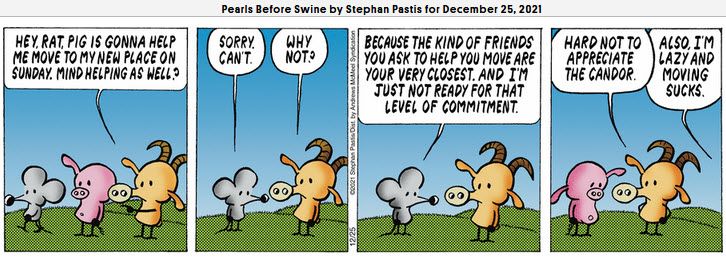Candor Can Swing Both Ways
As most of you who follow this column know, I often use daily comics as a resource for articles. In doing so, I'm just piggy-backing the talented cartoonists who represent and sometimes exaggerate real life as the basis for their works.
Here's an edition of Pearls Before Swine that triggered today's post.

Goat takes the high road and notes Rat's candor. One definition of candor is:
". . . the quality of being open and honest in expression; frankness".
Rat definitely demonstrates candor.
One of my former colleagues introduced me to the term "oversharing". Rat may qualify for that as well. In his "overshare", Rat's behavior may be interpreted by some as obnoxious.
So, while candor is often viewed as a positive aspect in one's behavior, there may be situations and circumstances where that is not the case.
Daniel Ofman Provides Perspective
Daniel Ofman's Core Quality Model provides a framework to understand the relationship between our core qualities (Strengths), our overdone strengths (Pitfalls), the complements to our strength (Challenges), and the negative opposite of our strengths (Allergies).
In this case, Rat's behavior appears to be an "overdone strength" (too much candor) resulting in a Pitfall.
In Ofman's framework, we don't think of Rat's behavior as a "weakness", but rather as a potential liability in regard to his effectiveness. It's too much of a potentially good thing, that being candor which is related to authenticity.
Working with Leaders
As we learned in working with the language of influence and the iWAM assessment, people in charge tend to want to decide more than not and tend to want to be in control. (Both, when not over- or underdone, tend to be positive characteristics in most settings.)
One implication is that these individuals may be resistant to feedback especially if that feedback contains information that is contrary either to their self-image or to the image they want to project to others.
When that is the case, how do you get crucial information to someone in a way that it is heard so that the individual can make choices about how they proceed with their management and leadership?
Ofman's framework is one way to do it. It is not necessary to talk about a "weakness", but, anchoring on a strength, it is more helpful and often more accurate to talk about:
- an overdone strength (Pitfall)
- the absence of a challenge (Complement)
- how one is responding to behavior opposite your strength (Allergy)
If you combine the Ofman framework with strategic questions such as "What happens when . . . ?", you can often generate a conversation that is useful to the individual and will have a chance of impacting positively future behavior.